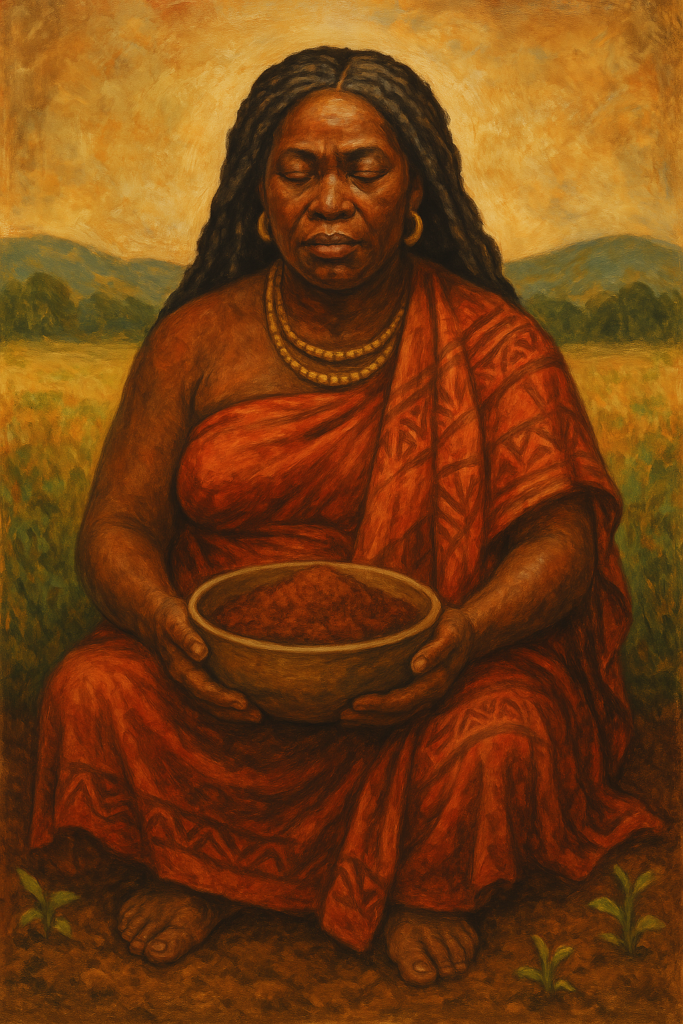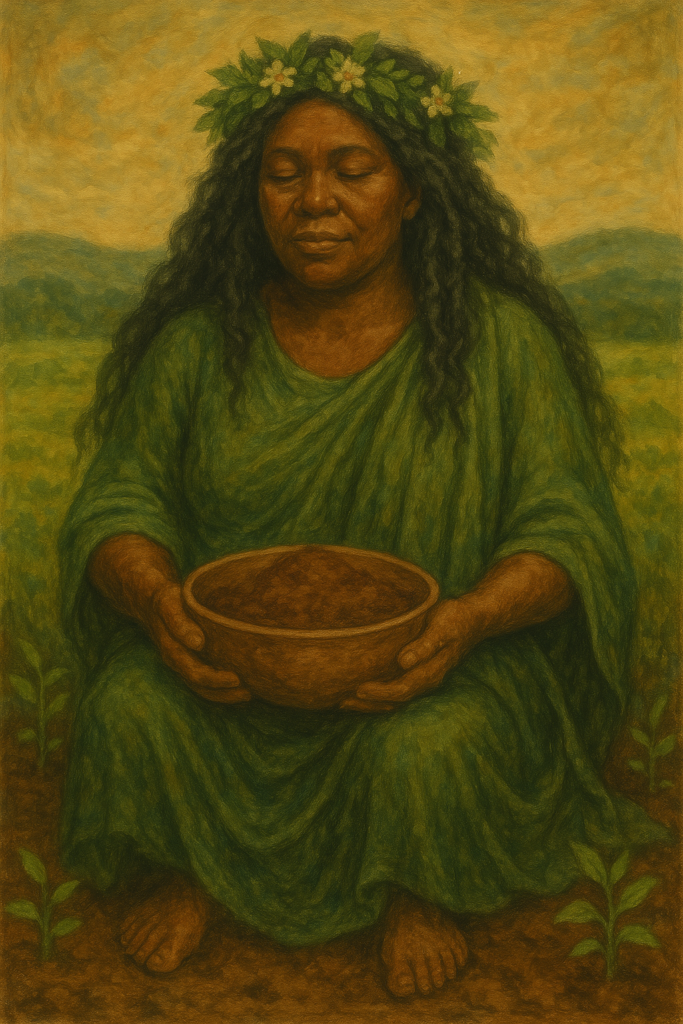Your cart is currently empty!
Asase Yaa


Other Names: Asase Ya, Asaase Yaa, Asase Afua (in alternate aspect)
Deity Type: Primordial Earth Goddess
Pantheon: Akan (including Ashanti, Fante, Akuapem, and Akyem peoples of Ghana and Ivory Coast)
Domains: Earth, agriculture, fertility, truth, morality, death, ancestry
Overview
Asase Yaa is the Akan goddess of the Earth and one of the most important deities in the traditional religious system of the Akan people of West Africa. She is venerated as the life-giver, the guardian of truth and justice, and the final destination of the dead. Often referred to as the Mother of Humanity, Asase Yaa represents the natural world, sustenance, and spiritual law. She is considered to be the Earth itself, a living and conscious entity worthy of devotion, care, and ritual observance.
Asase Yaa is not confined to temples. Her domain is the land, and her worship typically takes place outdoors through offerings poured directly into the soil, words of reverence, and observance of taboos that protect her sacredness.
Name and Linguistic Origins
The name “Asase” means “Earth” in the Akan language, while “Yaa” is the name traditionally given to females born on Thursday. In this cultural context, Asase Yaa is the Earth manifested as a female spiritual force associated with Thursday. Her name may also appear as “Asase Afua,” where “Afua” is the name given to females born on Friday. These two names represent different aspects or phases of the same Earth goddess.
Attributes and Domains
Asase Yaa presides over multiple aspects of Akan cosmology and cultural practice.
- Earth as a living being
- Fertility and agriculture
- Morality and truth
- Ancestral burial and the return of the body to the soil
- The balance between creation and death
She is associated with rural life, ethical conduct, and communal responsibility. Farmers, healers, and elders often invoke her blessings before tilling soil, planting, or engaging in communal conflict resolution.
Cultural and Spiritual Role
1. Personification of Earth
Asase Yaa is not a symbolic deity in the abstract sense. She is the Earth itself. The Akan consider her a divine mother whose body is the land they walk upon. Her sacredness is affirmed through daily practices, proverbs, and community laws.
2. Connection to Nyame
In most versions of Akan mythology, Asase Yaa is the wife or consort of Nyame, the supreme sky deity and creator. While Nyame governs the heavens and spiritual principles, Asase Yaa governs the material and ethical world. Together they form a cosmological pair that encompasses the entire universe.
3. Enforcer of Morality and Justice
Asase Yaa is the enforcer of truth. In legal disputes or sacred oaths, her name is invoked to guarantee honesty. It is widely believed that swearing falsely in her name can result in severe misfortune or spiritual punishment. This belief anchors her as the moral compass of Akan society.
4. Receiver of the Dead
The Akan believe that all human beings return to Asase Yaa upon death. Burial is viewed as a sacred reunion with the goddess. Therefore, disrespecting the earth, such as through careless land use or pollution, is also considered disrespect to the ancestors.
Dual Aspect: Asase Yaa and Asase Afua
In some traditions, the Earth goddess is expressed in dual forms:
Asase Yaa represents the old Earth
- Associated with death, wisdom, and dry lands
- Sacred day is Thursday
- Linked to elders, finality, and ancestral justice
Asase Afua represents the young Earth
- Associated with fertility, childbirth, and green fields
- Sacred day is Friday
- Linked to youth, new life, and procreation
This duality reflects the cyclical nature of existence in Akan cosmology, balancing life and death, beginning and end.
Worship and Practices
Worship Rituals
- Libations poured directly into the earth with spoken prayers
- Offerings made before planting or harvesting crops
- Acknowledgment before building or disturbing natural land
Taboos
- In many Akan communities, no digging, plowing, or construction is allowed on Thursdays, which is considered her sacred day
- Swearing falsely in her name is taboo and considered spiritually dangerous
- Disrespecting land, including through wasteful or violent actions, is viewed as sacrilege
Proverbs and Oral Tradition
Asase Yaa is deeply embedded in Akan oral culture. Proverbs highlight her central role in ethics, mortality, and land stewardship.
- “The Earth never lies”
- “From Asase we come, to Asase we return”
- “Do not swear by the Earth unless you are ready to face the Earth”
These sayings are used in courts, conflict mediation, and intergenerational teaching.
Modern Interpretations and Legacy
Asase Yaa remains a powerful figure in contemporary African spirituality and the diaspora. She appears in revivalist African traditional religious movements, eco-feminist theology, and pan-African spiritual systems. She is invoked in environmental activism, land justice, and gender liberation frameworks.
Her influence is especially visible in
- Afrocentric education and art
- Cultural festivals in Ghana and Ivory Coast
- African diasporic religions and reconnection movements
- Ecospiritual practices emphasizing care for the Earth
Organizations such as the Asase Yaa Cultural Arts Foundation in Brooklyn, New York, use her name to promote African culture, dance, and education.
Suggested Visual Depiction
Common artistic representations include Asase Yaa as a powerful mother figure with brown or red-toned skin, holding a calabash or gourd symbolizing nourishment, often barefoot to represent grounding in the earth. She may be shown surrounded by crops, ancestral symbols, or lying as the land itself.
Academic and Cultural Sources
1. Kwame Gyekye, African Cultural Values: An Introduction, Sankofa Publishing, 1996
2. Kofi Asare Opoku, West African Traditional Religion, FEP International Private Ltd, 1978
3. Nana Arhin Brempong, Asase Yaa and the Sacredness of the Land, in Ghanaian Perspectives on Faith and Morality, Institute of African Studies, University of Ghana
4. Jacob K. Olupona, African Religions: A Very Short Introduction, Oxford University Press, 2014
5. Agyeman-Duah, Ivor, Between Faith and History: African Spirituality in the Akan World, Accra: Ayebia Clarke Publishing
6. Akan elders’ oral accounts, compiled in African Belief Systems and Worldview, Ghana Ministry of Culture, Oral History Division
Leave a Reply